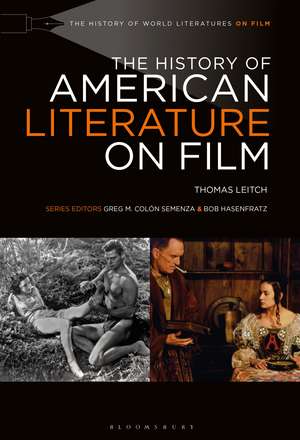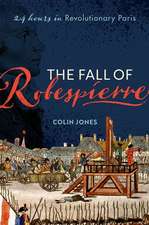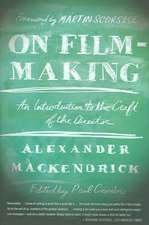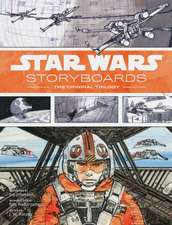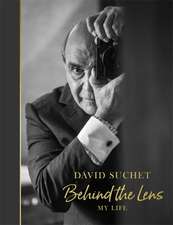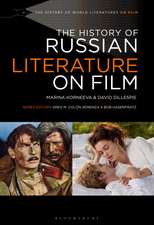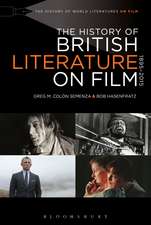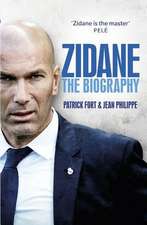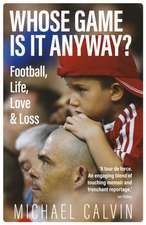The History of American Literature on Film: The History of World Literatures on Film
Autor Thomas Leitchen Limba Engleză Paperback – 29 dec 2021
| Toate formatele și edițiile | Preț | Express |
|---|---|---|
| Paperback (1) | 144.40 lei 6-8 săpt. | |
| Bloomsbury Publishing – 29 dec 2021 | 144.40 lei 6-8 săpt. | |
| Hardback (1) | 773.33 lei 6-8 săpt. | |
| Bloomsbury Publishing – 12 iun 2019 | 773.33 lei 6-8 săpt. |
Preț: 144.40 lei
Nou
Puncte Express: 217
Preț estimativ în valută:
27.63€ • 28.74$ • 22.81£
27.63€ • 28.74$ • 22.81£
Carte tipărită la comandă
Livrare economică 14-28 aprilie
Preluare comenzi: 021 569.72.76
Specificații
ISBN-13: 9781501390753
ISBN-10: 1501390759
Pagini: 464
Ilustrații: 91 bw illus
Dimensiuni: 152 x 229 mm
Greutate: 0.62 kg
Editura: Bloomsbury Publishing
Colecția Bloomsbury Academic
Seria The History of World Literatures on Film
Locul publicării:New York, United States
ISBN-10: 1501390759
Pagini: 464
Ilustrații: 91 bw illus
Dimensiuni: 152 x 229 mm
Greutate: 0.62 kg
Editura: Bloomsbury Publishing
Colecția Bloomsbury Academic
Seria The History of World Literatures on Film
Locul publicării:New York, United States
Caracteristici
Highlights filmed American literature as a unique film genre reflecting political and artistic priorities
Notă biografică
Thomas Leitch is Professor of English at the University of Delaware, USA. His most recent books are Wikipedia U: Knowledge, Authority, and Liberal Education in the Digital Age (2014) and The Oxford Handbook of Adaptation Studies (2017).
Cuprins
AcknowledgementsIntroduction: American Cinema and American LiteraturesChapter 1. 1895-1915: The Attraction of AdaptationChapter 2. 1915-1927: American ExoticsChapter 3. 1927-1939: Novel ImpressionsChapter 4. 1939-1951: Invisible AdaptationChapter 5. 1951-1967: Weaponized BestsellersChapter 6. 1967-1975: Counterculture ClassicsChapter 7. 1975-1989: Screening the SilencedChapter 8. 1989-2007: Adapt or DieChapter 9.2007-2018: Entertainment for MeBibliographyIndex
Recenzii
A thrilling story of the history of American literature on screen, from Hollywood's inception to the present, The History of American Literature on Film demonstrates Hollywood's diverse and fraught relation to American literary traditions. A boon to film, literature, adaptation, and media scholars, the book provides a history of Hollywood film, as well as a valuable analysis of the variegated and multiple "scripts" that provoke and serve as sources for film adaptations. Focused on distinct themes, yet wide-ranging and full of important insights about American film, literary, and media cultures, this exhilarating book is as informative as it is deeply pleasurable to read.
This monograph benefits from Thomas Leitch's extensive career researching and teaching American literature, film, and adaptation. Rigorously researched and rich with knowledge and insight, this wide-ranging, multi-faceted, deftly integrates larger purviews with closer analyses, bringing fresh and rigorous insights to long-standing debates. This formidable achievement is a valuable contribution to adaptation studies.
A superb achievement. Leitch challenges conventional notions of 'literature' and 'history' and in doing so puts practices of adaptation at the heart of Hollywood cinema. Writing with characteristic wit and intelligence, he traces how American cinema, in its irreverent approach to its national literature, shaped the cultural context for best-sellers, classics and comic books alike. Those who just dip in will find insights on every page, not just into films, stars and genres but into topics as diverse as the shift to sound in the 1930s and convergence culture in the 2000s. But Leitch's real achievement is to carry his sustained argument with such vigour and conviction over so many years of cinema history and so many pages of this absorbing book.
This monograph benefits from Thomas Leitch's extensive career researching and teaching American literature, film, and adaptation. Rigorously researched and rich with knowledge and insight, this wide-ranging, multi-faceted, deftly integrates larger purviews with closer analyses, bringing fresh and rigorous insights to long-standing debates. This formidable achievement is a valuable contribution to adaptation studies.
A superb achievement. Leitch challenges conventional notions of 'literature' and 'history' and in doing so puts practices of adaptation at the heart of Hollywood cinema. Writing with characteristic wit and intelligence, he traces how American cinema, in its irreverent approach to its national literature, shaped the cultural context for best-sellers, classics and comic books alike. Those who just dip in will find insights on every page, not just into films, stars and genres but into topics as diverse as the shift to sound in the 1930s and convergence culture in the 2000s. But Leitch's real achievement is to carry his sustained argument with such vigour and conviction over so many years of cinema history and so many pages of this absorbing book.
